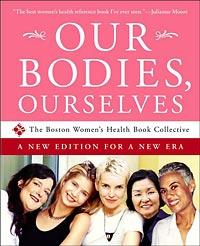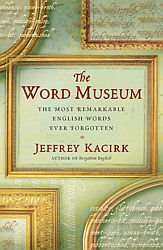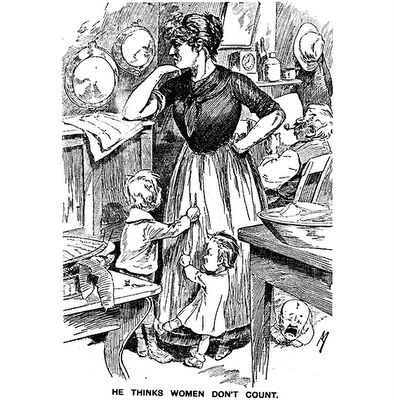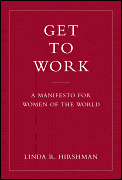 Get to Work: A Manifesto for Women of the World
Get to Work: A Manifesto for Women of the World, by Linda R. Hirshman, starts out well enough:
If Betty Friedan had lived just a little longer. We are about to restart the revolution. But now we have to do it without her. (From the first sentences of Get to Work - henceforth abbreviated as GTW, which is dedicated "In memory of Betty Friedan, Author, in 1963, of The Feminine Mystique".)
I've already written at length about Hirshman's articles (see
Over-Educated Stay-at-Home Moms Made Feminism Fail,
Hirshman and Feminism Again,
Addressing the Issues, and
Civil Discourse or Refreshing Honesty?), so I was prepared to be irritated by some portions of her book. I didn't expect to find a bunch of shoddy mistakes in it, though. Frankly, I expected better from a retired university professor and lawyer. I'm guessing that the speed with which
GTW was written and published may account for some of its flaws.
Get to Work was a book of sound bites, with some good ideas buried underneath, well larded with a mishmash of personal opinion. As I said in my last "
On My Nightstand" post, for a hardcover costing $19.95, it's pretty slim - including the seven pages of "Sources",
GTW totals only 101 pages. This does make for quick reading, however. And I do like the cover a lot, which is rather classy, with its dark red background (which goes well with manifesto, though I don't see every woman in the US ever having this little red book in her bag) and its no nonsense design.
Hirshman's first thesis is that "For all its achievements, feminism cannot make more progress, private or public, until it turns its spotlight on the family" (
GTW, p. 2).
Now this is something with which I wholeheartedly agree (see my review of Friedan's
The Second Stage,
Motherhood Discrimination or Special Privileges for Breeders?, and
Crystal Eastman's wonderful article, written in 1920 after women in the US won the right to vote).
How exactly feminists should turn their spotlight on the family - and how and where we should fight to change things, in both the public & private spheres - well, this is where Hirshman differs from me, and from many other feminists - so radically, and yet so paradoxically conservatively. But more on this later.
Hirshman's problems with educated women "opting out" of the paying workforce include the following points (summarized in my own words):
- - Women at home don't (and cannot) fully use their capabilities (i.e., they are "unfulfilled")
- - This at-home status makes them dependent on their husbands - especially economically, but also socially and in terms in decision-making and bargaining power
- - Female talent is lost from the public world ("to the private world of laundry and kissing boo-boos" as Hirshman puts it)
- - The ruling class (sociopolitical movers & shakers) continues to be overwhelmingly male
- - All of the above sends the US in the wrong direction, or generally does more harm than good to our society
Hirshman's prescription for the above are her rules, or her "Strategic Plan to Get to Work" (summarized, as with the above points, with my own comments):
- - Don't study art (or anything else where you can't make enough money to live on)
- - Never quit a job unless you have another one (don't be unemployed!)
- - Never know when you're out of milk (i.e., don't take charge of household tasks)
- - Consider a "reproductive strike" (just have one kid, maybe, definitely no more)
- - Get the government you deserve (vote, dammit, and vote appropriately)
Interestingly, "marry down" isn't listed in the prescriptive rules here, as it was in Hirshman's earlier articles. I see on
her blog she has altered this rule to "don't marry a jerk", which is advice that’s hard to dispute.
It is unfortunate that so much of the internet reaction to Hirshman's ideas has been in the form of knee-jerk reactions and/or personal slander. Both Hirshman and some of her critics have armored themselves in impregnable (no pun intended!) self-righteousness, from whence they fire off personal potshots - completely irrelevant to the issues above – with sneering abandon. Of course some tired conservative critics yet again pulled "feminazi" out, but I was also dismayed to see that Hirshman wasn't above throwing a reference to "Mommy nazis" (p. 29,
GTW) into her book.
Judith Stadtman Tucker's article, entitled
Everybody Hates Linda, and a more recent review of
GTW,
Reviving the Feminist Mystique, stand in marked contrast to the unthinking reactions, along with most of the blogs that I linked to in my previous posts about Hirshman. Some of Hirshman's points and some of her strategic rules are genuinely worthy of thought and further discussion, and I've seen a lot of this recently at places like
MomsRising and the
Mothers Movement Online (although Hirshman dismisses the latter as "a good source for what passes for feminist activism on the family", p. 97,
GTW).
But back to the book. Hirshman has decided than the ideology celebrating personal choice is a major player in modern feminism's failures, and she describes it at some length:
"Choice feminism", the shadowy remnant of the original movement, tells women that their choices, everyone's choices, the incredibly constrained "choices" they made, are good choices. Everyone says if feminism failed it was because it was too radical. But we know - and surely the real radical, Betty Friedan, knew - that it wasn't because feminism was too radical. It was because feminism was not radical enough (pp. 1-2 GTW, bold emphasis mine).
"Choice" is the weasel word, and it is legitimated, especially for women who consider themselves liberals, because it's been adopted by the feminist movement. Even the most empowered women do not see how narrow their options are at the moment of "choice" (p. 16, GTW, bold emphasis mine again).
"...feminism has actively encouraged women to run from a fight by embracing any decision a woman makes as a feminist act. I have dubbed this watered-down version of feminism choice feminism" (pp. 17-18, GTW).
"The choice is a false one, based on the realities of a half-revolutionized society. Once we recognize that, we can admit that the tools feminism offered women to escape the dilemma have failed. The book is an effort to try a different approach. It is time for a new radicalism (p. 25, GTW, bold emphasis mine).
Now on the one hand (as in the emphasized passages above), Hirshman acknowledges that women's choices about working and staying home with children are incredibly constrained. Or false, even. She acknowledges that the high cost of daycare (and I would add that
high quality daycare or daycare for any kind of special needs costs even more) plays a role in many middle class mothers' decisions to stay home. Yet instead of promoting real choice, Hirshman opts for staying with the WOH/SAH dichotomy that our economy presently dictates, passing off current feminist calls (and Friedan's passionate arguments in
The Second Stage) to "restructure the architecture of the workplace" as the "same old public day-care business that has gone nowhere since 1972", which she argues is merely a ruse to "accommodate women in their role as caretaker of the patriarchal family" (p. 6,
GTW). Hirshman goes on to state that "Even in 2006, NOW's “family” initiative is all about building caring coalitions and funding child care and family leave in the public sphere rather than taking on the inequality where it lives" (pp. 22-23,
GTW).
Personally, I think that restructuring both the family (dividing household and childcare tasks more evenly)
and the workplace (to be more "family- friendly") is much more radical than Hirshman's suggestions, which leave the corporate underpinnings that devalue the private sphere totally unchanged. In fact, encouraging upper-class parents to employ lower-class women to care for their children and clean their houses strikes me as downright conservative.
When challenged by many who say that work in the public sphere is overrated (especially if it is not an economic necessity), Hirshman huffs that "just because work isn't as wonderful as people fantasized does not mean it isn't usually the best alternative available" (p. 15,
GTW), and that "Working in the market economy has many rewards - of power, honor, money, exercise of capacities, and so on (p. 16,
GTW). She adds that "it seems extremely unlikely that all the jobs in the public world are soul-destroying tyrannies or that all home life is a bucolic paradise" (p. 79,
GTW), which is undeniable. But the reverse appears equally undeniable to me.
And what about all of the mothers who sequence (move in and out of the workforce), or work part-time, you ask? Well, you'd have to consult one of the books in my footnote for that kind of subtlety or real analysis. What about the influence of the media on how we perceive mothers? Hirshman mentions "the new momism", but apparently she didn't think that
The Mommy Myth: The Idealization of Motherhood and How It Has Undermined Women, by Susan Douglas and Meredith Williams, deserved the same kind of acknowledgement that Nora Ephron's
Heartburn ("Where's the butter?") did in her sources.
Although Hirshman does encourage women to demand gender equality at home, her opinion of
anyone - male or female - who chooses to engage in childcare, housework, or any other unpaid labor at the expense of paid employment is very clear. It taints the book with an elitism that overshadows the real and important issues of gender inequality that she raises. Stay-at-home dads, whom she discounts as a minor statistical blip (instead of a genuine trend linked to greater male participation in housework and childcare) are denigrated as "Mr. Mom", which is a label that I thought went out with the 80's.
It is Hirshman's characterization of stay-at-home mothers, of course, that raised the most ire on the internet, and that was probably the deciding factor in bringing Hirshman's work to popular media attention (and a book contract). Not only does Hirshman continue to perpetuate a rigid and demonstrably false* dichotomy between SAH/WOH mothers in
GTW, but she goes to great lengths to belittle mothers who "choose" to stay home. These women are never referred to as mothers or even as women in
GTW, but are consistently labeled "moms", "the mommy bunch", "homebodies", and once, memorably, as "a kind of miniaturist in the business of life" (p. 17,
GTW). In contrast, women with paying jobs are usually lauded as "workingwomen".
Not content with merely labeling, Hirshman goes on to caricature and objectify stay-at-home mothers in manner that only
Michael Noer could come close to approximating:
By any measure, a life of housework and child care does not meet these standards for a good human life (p. 33, GTW).
Both my interviews and the public debate reflect that women who drop out of the public world demonstrate a singular indifference to the larger society (p. 38, GTW).
When they write to me, the homebodies, like the merry maid in the treetops with NPR on her Ipod and a letter to her congressman in her overalls, paint a romantic picture of flourishing in the domestic sphere (p. 78, GTW).
...is not all this biking and tree climbing a bit too much of the inner child for any normal adult? (p. 34, GTW).
[in reference to traditional gender roles vs. modern sah-moms' choices]...The chains just transmuted from golden links into the bonds of the invisible fence, like the one that people use to confine their dogs to the yard. (p. 43, GTW)
Hirshman's descriptions of stay-at-home mothers appear to come from a variety of media accounts: Judith Warner's
Perfect Madness, her sampling of blogs and message boards, her survey of the
New York Times' Style section brides, and Betty Friedan's
The Feminine Mystique. It is hardly surprising that such cherry-picking produces a decidedly skewed result that does little to inform us about how fulfilling women that are not officially employed find their lives, their use of their education or talents, and their personal power, freedom, or economic dependence. But from the way Hirshman talks about these women, it doesn't appear that she believes that they deserve feminism's rewards, anyway.
As I read GTW, I couldn't help thinking of Betty Friedan's description of "the feminist mystique" (as opposed to the "the feminine mystique") in The Second Stage. Friedan describes "the feminist mystique" as some feminists' misguided and extreme attempts to be as different from the idealized housewives of the 50's and 60's (and often, their own mothers' life experiences) as possible, which she saw as ultimately damaging to feminism. No wonder that despite dedicating GTW to Friedan, Hirshman gripes that The Second Stage is both "dispirited" and "full of useless, grandiose, and wishful rhetoric" (p. 21, GTW). I guess it won't come as a great surprise to many readers that I found The Second Stage inspiring and surprisingly relevant today. I also thought The Second Stage was a great deal less pretentious than Get to Work, which included an unfortunate soupçon of philosophy and Plato in support of Hirshman's opinions about moral relativism, the right kind of values, and what constitutes a good life.
A few final irritating details that Hirshman and/or an editor should have caught: “The wonderful description of managing your husband’s housekeeping comes from the Blog Bitch PhD:” (p. 97, GTW) has the wrong hyperlink. The link should take you to My Radical Married Feminist Manifesto, not a discussion of South Dakota's abortion ban (and in case you’re confused, the blog’s title is actually Bitch PhD).
"There’s even a communal, bisexual, universally faithless monkey, the bonobo. Female bonobo polygamous” (p. 77, GTW). Bonobos are chimpanzees. Not monkeys. Yes, there is a difference, and it is not a minor one. And it is just weird to talk about bonobo fidelity in this context. The whole part on Evolutionary Psychology in GTW is just weird and an over simplified "strawmonkey". For a serious look at primate “fidelity” and evolutionary biology, check out Barbara Smuts' books or Frans de Waals' essays on bonobos.
And what is it with these non-fiction, supposedly serious books without indices? Are publishers trying to make it harder for readers to find the sections or quotes that interest them? Or do the authors and publishers just assume that once a book has been read, it’s immediately forgotten, never to be referred to again?
A lot of people have compared Linda Hirshman to Caitlin Flanagan (most notably Katha Pollitt), mainly because of their extremist views and propensity for snide remarks. When it comes to the books themselves, I actually found To Hell With All That rather enjoyable (see here), although I disagreed with Flanagan on many issues. If I owned Get to Work, on the other hand, I'd have to file it next to Darla Shine's Happy Housewives on my bookshelf, as another catchpenny classic in the sad tradition of self-serving, grandiose advice literature that purports to empower women and improve their lives.
*see Miriam Pesowitz's well-researched book, The Truth Behind the Mommy Wars. Strangely, Hirshman frequently denigrates Peskowitz personally, while totally ignoring her book, which addresses these topics in great detail. Peskowitz does not appear in Hirshman's list of "Sources" - nor do Ann Crittenden and Arlie Russell Hoschschild, whom have also written thoughtfully (and done much better research) concerning work-family balance and the processes of decision making on these issues.
Tags:friedan, mommy+blogger, book+reviews, books, hirshman, feminism, stay-at-home+moms, SAH-moms, opt-out, mommy+wars
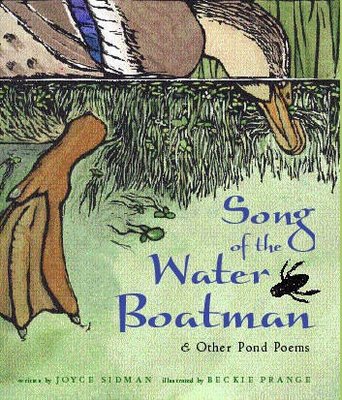 This is a gorgeous book and I am so grateful that Jennifer (Under the Ponderosas) recommended it. It has the most beautiful, strong, graceful woodcuts I've ever seen, and such lovely, whimsical poems and wonderfully descriptive blurbs on natural history for kids. I think I like this book more than my kids do, though.
This is a gorgeous book and I am so grateful that Jennifer (Under the Ponderosas) recommended it. It has the most beautiful, strong, graceful woodcuts I've ever seen, and such lovely, whimsical poems and wonderfully descriptive blurbs on natural history for kids. I think I like this book more than my kids do, though.
